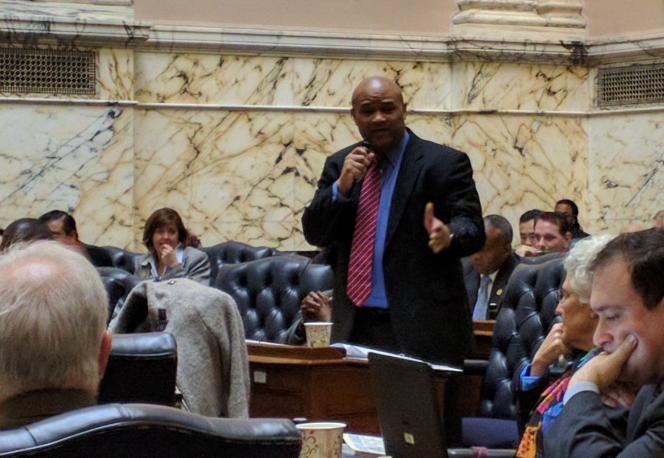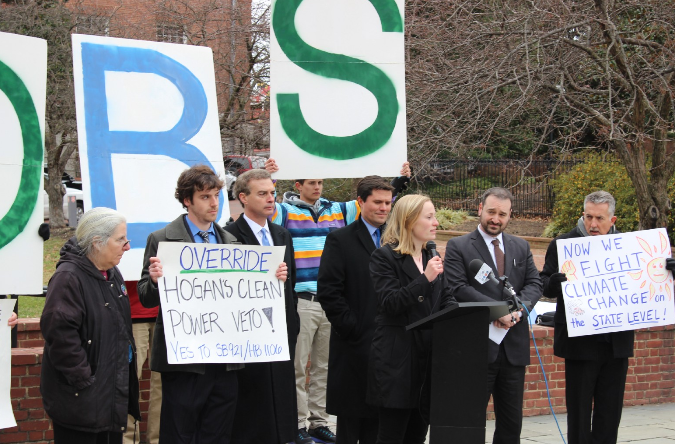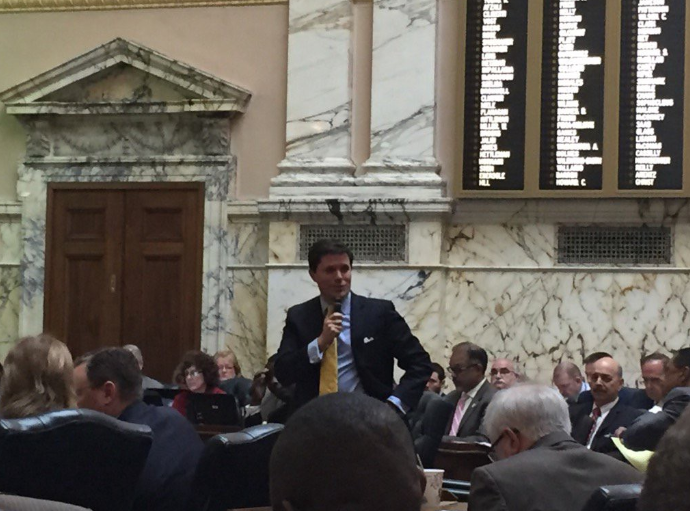The Maryland Legislature’s renewable energy veto override, explained
On Tuesday, the Maryland House of Delegates voted to override Governor Larry Hogan’s veto of the Clean Energy Jobs Act. Earlier this morning, the Maryland Senate followed suit, voting 32–13 in favor of the override.
On Tuesday, the Maryland House of Delegates voted to override Governor Larry Hogan’s veto of the Clean Energy Jobs Act. Earlier this morning, the Maryland Senate followed suit, voting 32–13 in favor of the override.
This is a huge victory for Marylanders and renewable energy, paving the way for even stronger commitments in the future.
How we got here:
In 2016, legislators voted overwhelmingly and in a bipartisan fashion to pass the Clean Energy Jobs Act, an important step in moving away from fossil fuels and combating global warming. It was a key element of Maryland’s plan to meet its emission reduction targets.

Delegate Dereck E. Davis speaks in support of overriding the veto.
Unfortunately, Governor Hogan vetoed the bill, erroneously calling it a “sunshine and wind tax.” In reality, the bill may only cost residential customers 52 cents per month in 2020. And that study didn’t take into account further decreases in renewable energy costs, nor the environmental benefits.
Hogan’s veto was at odds with public support for acting on climate and shifting to clean energy. 71 percent of Marylanders supported expanding the state’s renewable portfolio standard (RPS). That’s why Environment Maryland joined allies urging the legislature to push back and override the veto. On January 5th, Environment Maryland joined bill sponsors, environmental advocates, and renewable energy industry leaders at a rally calling on legislators to overturn the veto.

Environment Maryland’s Anna Hofmann: “From abundant offshore wind resources to the power of the sun, Maryland has plenty of pollution-free renewable energy. For the sake of our climate and our environment, we must reject special interest attempts to stall clean energy’s momentum and override Governor Hogan’s veto.”
Working with our allies, we tapped into the broad public support and generated hundreds of notes and many calls into legislators, including from public health professionals.
Ultimately, public pressure urging legislators to support renewable energy won the day.
Why the override is a big deal:
The bill ramps up Maryland’s renewable portfolio standard (RPS) to 25 percent by 2020, meaning that electricity providers are required to supply more energy from solar and wind.
And even though this increase is fairly modest, there’s no underestimating the environmental impact of using more renewable energy. First and foremost, it will improve air quality. Baltimore City has the highest rate of premature mortality from air pollution in the United States, and 75 percent of Marylanders live in areas that received a D or F air quality grade from the American Lung Association. Using Environmental Protection Agency (EPA) models, it’s estimated that the Clean Energy Jobs Act would prevent up to 50 premature deaths and 600 asthma attacks annually.

Delegate Bill Frick, the sponsor of the veto override, speaks in the House chamber.
It also allows Maryland to keep doing its part to combat global warming. The Clean Energy Jobs Act will reduce carbon emissions by the equivalent of taking 563,000 cars off the road annually. While it’s certainly true that we need bolder and stronger commitments — ultimately reaching 100 percent renewable energy — this is certainly a good start.
At a time when the country seems more divided than ever, it’s inspiring to see bipartisan support on renewable energy. A majority of Republicans, Democrats and Independents support the Clean Energy Jobs Act statewide. And there is widespread support for the bill in rural, urban and suburban communities. Renewable energy truly is a great unifier.
We are encouraged by the events in Maryland, and look forward to building more support for renewable energy nationwide. Onward!

